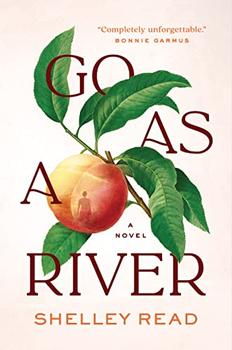Summary | Excerpt | Reading Guide | Reviews | Beyond the Book | Readalikes | Genres & Themes | Author Bio

A Novel
by Shelley ReadOne
1948
He wasn't much to look at.
Not at first, anyway.
"Pardon," the young man said, a grimy thumb and forefinger tugging at the brim of his tattered red ball cap. "This the way to the flop?"
As simple as that. This ordinary question from a filthy stranger walking up Main Street just as I arrived at the intersection with North Laura.
His overalls and hands were blackened with coal, which I assumed was axle grease or layers of dirt from the fields, though it was too dark for either. His cheeks were smudged. Tan skin shone through trickled sweat. Straight black hair jutted from beneath his cap.
The autumn day had begun as ordinary as the porridge and fried eggs I had served the men for breakfast. I noticed nothing uncommon as I went on to tend the house and the docile animals in their pens, picked two baskets of late-season peaches in the cool morning air, and made my daily deliveries pulling the rickety wagon behind my bicycle, then returned home to cook lunch. But I've come to understand how the exceptional lurks beneath the ordinary, like the deep and mysterious world beneath the surface of the sea.
"The way to everything," I replied.
I was not trying to be witty or catch his notice, but the angle of his pause and slight twist of smile showed that my response amused him. He made my insides leap, looking at me that way.
"Real small town, I mean." I tried to set things straight, to clarify that I was not the type of girl that boys noticed or paused to smirk at on a street corner.
The stranger's eyes were as dark and shiny as a raven's wing. And kind—that is what I remember most about those eyes from that first glimpse until the final gaze—a gentleness that seemed to fountain from his center and spill out like an overflowing well. He studied me a moment, still grinning, then pulled again at his cap brim and continued walking toward Dunlap's boarding house near the end of Main.
It was true that this one crumbling sidewalk led to everything. Along with Dunlap's, we had the Iola Hotel for fancy folks and the tavern tacked on the back for drinking folks; Jernigan's Standard station, hardware, and post; the café that always smelled of coffee and bacon; and Chapman's Big Little Store, with groceries and a deli counter and too much gossip. At the west end of it all stood the tall flagpole between the schoolhouse I once attended and the white clapboard church where our family used to sit, polished and proper, every Sunday when Mother was alive. Beyond that, Main Street dove abruptly into the hillside like a period after a short sentence.
I was heading in the same direction as the stranger—to drag my brother out of the poker cabin behind Jernigan's—but I wasn't about to walk right on this boy's heels. I paused there at the corner and shielded my eyes from the afternoon sun to study him as he continued on. He strolled slowly, casually, like his only destination was his next step, his arms swinging at his sides, his head seemingly a tad behind the pace. His dingy white T-shirt stretched tightly beneath the straps of his overalls. He was slim, with the muscular shoulders of a workhand.
As if he felt my gaze, he suddenly turned and flashed a smile, dazzling against his soiled face. I gasped at being caught eyeing him. A rush of heat tickled up my neck. He tugged his cap as he had before, turned, and strolled on. Though I couldn't see his face, I was pretty sure he was still grinning.
It was a fateful moment, I know in retrospect. For I could have turned and headed back down North Laura, toward home and fixing supper, could have let Seth stumble to the farm on his own accord, stagger in the door right in front of Daddy and Uncle Og with his own hell to pay. I could have at least crossed over to the other side of Main, put the occasional car and a row of yellowing cottonwood trees between our two sidewalks. But I didn't, and this made all the difference in the world.
Excerpted from Go as a River by Shelley Read. Copyright © 2023 by Shelley Read. Excerpted by permission of Spiegel & Grau. All rights reserved. No part of this excerpt may be reproduced or reprinted without permission in writing from the publisher.
Your guide toexceptional books
BookBrowse seeks out and recommends the best in contemporary fiction and nonfiction—books that not only engage and entertain but also deepen our understanding of ourselves and the world around us.